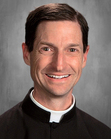Fr. Laisney's Support of The Realist Guide

Fr François Laisney, former District Superior of the United States and then of Australia, author of Archbishop Lefebvre And The Vatican and Is Feeneyism Catholic?, and current prior in New Zealand, has written a positive review of The Realist Guide on the Angelus website. Among other things, he says the following about the book:
I read the whole book, and truly consider its contribution to the defense of the Faith very important in our modern world… Note that Father Robinson does not support evolution. The big-bang theory, which Father shows as compatible with the faith, should rather be put in parallel with the growth of a baby in the womb: it starts very small (the primeval atom / the first cell) and unfolds in a most marvellous way, yet perfectly PLANNED by the Divine Intelligence. Both unfolding manifest in a beautiful way the Wisdom and the omnipotence of God as the Author of Nature. And that is much better than the notion of God as a fairy with a wand making all things on the spot as we see it today: this is imagination, and not theology.
Fr Laisney has also had occasion to defend the position that The Realist Guide takes on the question of The Great Flood. He has given permission for an excerpt from a letter he wrote on this subject to be published on The Realist Guide blog. Here follows the excerpt, which continues to the end of this page.
“You joined some thoughts about a sentence in Fr Paul Robinson’s excellent book The Realist Guide to Religion and Science, questioning what he writes ‘against a geographically universal flood.’ It is quite providential that your letter arrives so close after the feast of the Ascension. Indeed, the homily of St Gregory at Matins of that feast sheds light on that very matter. In the third reading of that homily, ninth lesson of Matins, St Gregory says:
When then, He had rebuked the hardness of their heart, what command did He give them? Let us hear. "Go ye into all the world and preach the Gospel to every creature." Was the Holy Gospel, then my brethren, to be preached to thing insensate, or to brute beasts, that the Lord said to His disciples: "Preach the Gospel to every creature"? Nay, but by the words "every creature" we must understand man, in whom are combined qualities of all creatures. Being he hath in common with stones, life in common with trees, feeling in common with beasts, understanding in common with angels. If, then, man hath something in common with every creature, man is to a certain extent every creature. The Gospel, then, if it be preached to man only, is preached to every creature.
Now let us reflect on what St Gregory teaches. Our Lord Jesus Christ said: ‘preach the Gospel to every creature.’ And St Gregory explains: it does not apply to every creature, but only to every man. Thus, we are not obliged to go onto the moon to preach to the stones there, nor to go to Mars or Venus, nor any other planet or star. We may stay on the earth and even there, we are not obliged to preach to every penguin in Antarctica: it is sufficient to preach to every man.
Similarly, when Moses says in the book of Genesis “And the waters prevailed beyond measure upon the earth: and all the high mountains under the whole heaven were covered – opertique sunt omnes montes excelsi sub universo caelo” (Gen. 7:19), it is sufficient to say: it covered the whole heaven where men were living, so that all men were engulfed in the Flood, not necessarily the top of Mount Everest, because there was no one there, nor anywhere around, because men had not yet spread over the earth: it was before the tower of Babel.
Do you see the parallel of such interpretation with that of St Gregory? As St Gregory is not opposed to the truth of the Gospel when he applies the universality of the words of our Lord merely to all men, so is Fr Paul Robinson not opposed to the truth of Genesis when he applies the universality of the flood merely to all men. He does not say the Scriptures is wrong, he says its universality is that of all men (and women!). Such interpretation is not a denial of the inerrancy of the Scriptures, it is rather proposing the right interpretation of the Scriptures and is in perfect conformity with St Gregory according to the exegetical principles of St Thomas Aquinas and St Augustine.
Please, do consider this: God does not say one thing to one and the opposite to the other. He is the Author of Nature, and one can consider Nature as a big book that speak to us about its Author. Every flower tells us: “God made me!” The Scripture itself tells us: “The heavens shew forth the glory of God, and the firmament declareth the work of his hands” (Ps. 18:2). And that is true not only of the heavens, but also of the earth: every creature somehow speaks to us about its Creator.
Now when we study the book of nature, we find fossils that “tell” us that they are very old. Did God create dead fossils that appear to be so old, but in fact never lived? Were they created dead? Not a single Father of the Church ever claimed that! We should rather believe that God is as true in the Book of Nature as in the Scriptures! This is the teaching of the Fathers and of the Church. The important thing is to understand properly the one and the other. What Father Robinson teaches – and very well – is precisely that the conflicts between religion and science only comes when people do not understand properly one or the other or both. And the way to reach a proper understanding of both is precisely to adopt a realist philosophy, which is that of St Thomas Aquinas, and which the Church made her own.
So, similarly, when St Peter says: “the world that then was, being overflowed with water, perished” (2 Pet. 3:6), he does not mean that the whole universe perished, but only the inhabited world, it was everything that the men of the time had ever known, their world. Such interpretation is very much respectful of the truth of the Scriptures, and follows exactly St Gregory’s exegesis.
At the end of your reflections you mention the principle of uniformity. This principle states simply that the Laws of nature, as we know them today, have been the same since the beginning of creation and shall remain the same until the end of time. Such principle is most certainly not opposed to the faith. First of all, the very acknowledgement of natural laws evidently implies that the acknowledgement of the existence of a Lawmaker, i.e. God! Moreover, such principle is not against miracles: God is not limited by the very laws that He has set. He can produce an effect without its normal natural causes. Now the Flood is like the crossing of the red sea: both are miracles, and both signify Baptism. A miracle such as the Flood does not terminate the Laws of nature: they were true before and remain true after even though God bypassed them for the duration of that miracle.
Thus, the dogma of the flood is not opposed to the natural principle of uniformity.
I hope that these explanations can be of a help, to better understand the holy Scriptures and to appreciate the value of Father Paul Robinson’s excellent book.
Published on June 21, 2019 17:53
•
Tags:
book-review, creationism, françois-laisney, great-flood, sacred-scripture
No comments have been added yet.



